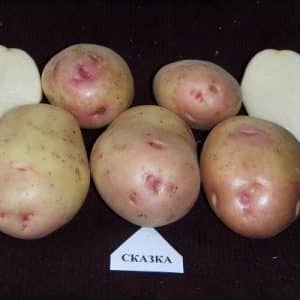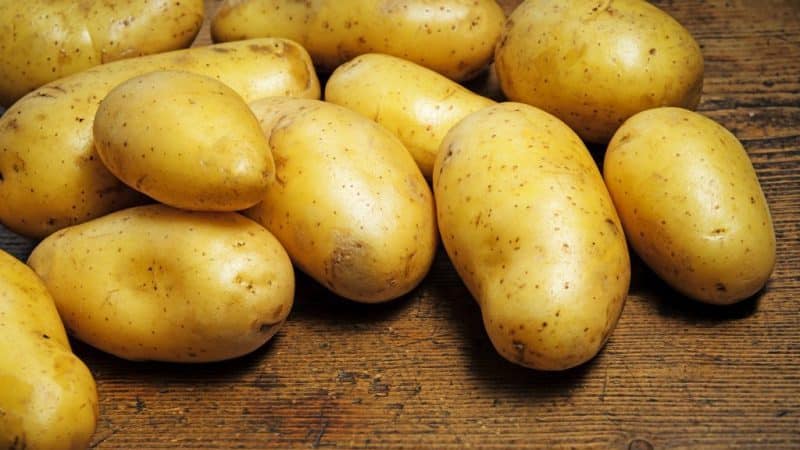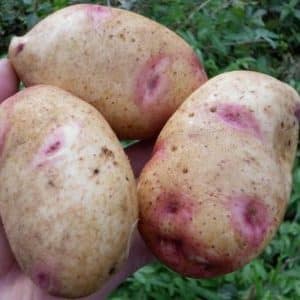Domestic table potato variety “Skazka”
Potatoes are a popular crop for growing in the countryside and on farms. The vegetable is beloved by breeders: every year several new varieties appear in Russia alone. Among the most successful mid-season crops of domestic selection is the Skazka variety.
Description of potato variety
Skazka is a medium-early ripening table variety. Ripens in 70-90 days. The plant is a medium-sized bush up to 80 cm tall with erect stems, which is convenient for hilling.
In the photo - Skazka potatoes.

Origin and development
The variety was bred in 2004 by breeders of the Leningrad Research Institute “Belogorka” and LLC Breeding Company “Liga” N. Gadzhiev, V. Lebedeva and M. Ivanov. The tale was derived from work with three subspecies of potatoes: S. demissum, S. tuberosum and S. vernei. Potatoes took the best from each parent.
From one - the smooth shape and starch content, from the other - resistance to diseases and pests, the third conveyed taste.
Reference. The average starch content in root crops of the Skazka variety is 14-17%.
Distinctive features and appearance
The tubers of this variety are oval, medium in size, weighing 70-130 g. The skin is smooth, beige in color, on the surface there are eyes of medium depth, colored pink. The pulp is white.
Description and characteristics of the plant
Potato bushes form up to six stems. The leaves are small, light green, porous in structure. The flowers are large and contain five purple inflorescences.
Productivity
The variety is high-yielding.Its main feature is multi-tuberism. Up to 30 medium-sized tubers are formed on one bush. The second feature is that small seed potato tubers produce the same yield as large ones.
Subject to storage conditions, the keeping quality of tubers is 90%. The taste of potatoes is creamy, the tubers do not become overcooked and do not lose color during heat treatment.
How to grow this variety
Agricultural practices are standard. It is necessary to choose a suitable place for planting, properly carry out hilling and watering.
Dates, scheme and rules of planting
Planting potatoes carried out in early May, when the soil warms up to +8... +9°C. Planting depth depends on the soil. On light, sandy soils, the depth will be 10-15 cm, on heavy soils - no more than 5 cm. The distance between holes is maintained from 25 to 40 cm. Row spacing is 60-70 cm. Compliance with these standards makes it easier to care for plantings and ensures ventilation and lighting of the bushes .
Potatoes are planted in a lighted area. The variety prefers moist soil, but rots when water stagnates.
The soil for planting is prepared in advance, in the fall. Add humus 3-4 cm thick and plow it. When planting, add a glass of ash, humus and a handful of superphosphate into the hole.
In 3-4 weeks, planting material is removed from storage areas and germinated.
Care
Plantings are irrigated 5-7 times during the growing season. The interval between watering is 7-10 days.
Attention! The soil should not be allowed to dry out. If there is no rain, water more often.
In the intervals between waterings, the plantings are hilled, moving the soil from the row to the bush. Additional stolons are formed on the ridge. The first time potatoes are hilled 10-15 days after the first shoots appear. The second hilling is carried out 3 weeks after the first.
Timely fertilizing increases productivity. Fertilizers are applied to moist soil before hilling.
- After emergence of seedlings, nitrogen is added: 1 tbsp. l. urea is dissolved in 10 liters of water. This amount is enough for twenty plants.
- Before hilling, add chicken manure, diluted in 10 liters of water and infused for 24 hours. This solution is poured under the root, without getting on the leaves.
- After flowering is completed, phosphorus is added. For 100 liters of water, take 1 kg of superphosphate and spray it over 100 square meters. m.
- You can use herbal feeding. To do this, pour a bucket of chopped weeds with 20 buckets of water and leave for a week. After a week, the infusion is ready for use. You can add a glass of ash.
Nuances of cultivation and possible difficulties - diseases and pests
The variety is unpretentious and does not require special attention. It is only important to monitor the soil moisture, not to allow it to dry out, but also not to overwater the bushes.
The Skazka variety shows the best results on chernozems, sandy loam and loamy soils. Good predecessors for it are legumes, cabbage or cucumbers.
Potatoes are susceptible diseases And pests the nightshade family. The Skazka variety is immune to scab, cancer, rhizoctonia and alternaria, but sometimes the bushes become infected with late blight.
Timely spraying helps fight Colorado potato beetle, potato moth, wireworm and mole cricket.
Important! Plowing the soil in the fall will get rid of many bacteria and harmful insects that die from low temperatures.
Collection, storage and use of crops

Harvest in September. A week before harvesting, the tops are mowed to get rid of diseases and allow the root crops to ripen.
The dug up tubers are air dried for 6-10 hours.Then the dried potatoes are sorted, damaged and infected root crops are selected. The harvest is harvested for storage in cellars and basements, where the temperature is maintained at no more than +2°C. Humidity should be 90%. The room is sometimes ventilated, and spoiled tubers are sorted and removed once a month.
This variety is considered universal. It is boiled in its skin and used in salads, purees, and first courses. They also make casseroles.
Advantages and disadvantages of the variety
Advantages:
- high productivity;
- excellent taste;
- early ripening;
- good keeping quality;
- low maintenance
- resistance to diseases and pests;
- high commercial qualities.
Flaws:
- deep eyes, making it difficult to clean tubers;
- a spreading tall bush makes the maintenance process difficult.
For which regions is it best suited?
The variety was created for cultivation in the Ural, Middle Volga and Far Eastern regions. Today, the Fairy Tale has spread throughout Russia and the CIS countries, Moldova and Ukraine.
Farmer reviews
Reviews about the variety are mostly positive. The tale is suitable for small farms. Negative opinions can be heard from those whose employment did not allow timely and full-scale agricultural work to be carried out.
Mikhail, Ekaterinburg: “The Skazka potato is my pride; it has been growing at the dacha under careful supervision since 2016. I make stews, purees, and casseroles from the fruits; all my friends praise the dishes. I recommend it to everyone – a problem-free, productive variety.”
Alena, Voronezh: “The Skazka variety really shows fabulous yields, despite my little experience in farming.As a piece of advice, I would draw attention to the need for timely hilling, which can be carried out even more than 2 times, combined with loosening. As for fertilizing, it is better to alternate organic matter with mineral fertilizers. From organic matter, I choose any compost and dilute it in a ratio of 1:10. For mineral fertilizers I use potassium sulfate or superphosphate (35-40 g per 1 liter of water).”
Lyudmila, Kyiv: “We grew it 3 years ago. The tubers are smooth and large. I didn’t like the fact that there were eyes, and very deep ones at that. The taste is normal, but they abandoned the variety because they liked the others better.”
Conclusion
Skazka is an unpretentious variety for growing in the garden or small farm. But, like any culture, it requires attention. Regular watering, hilling, fertilizing and selecting high-quality planting material will provide you with a rich harvest of tasty potatoes.